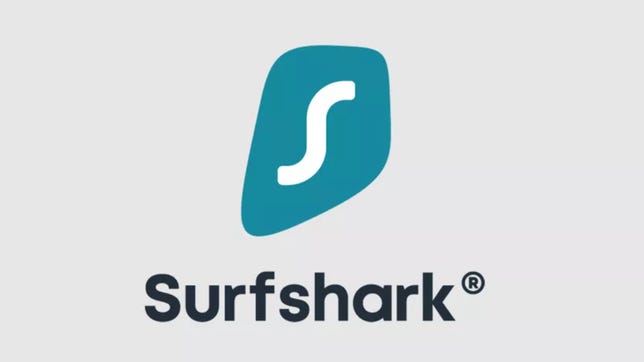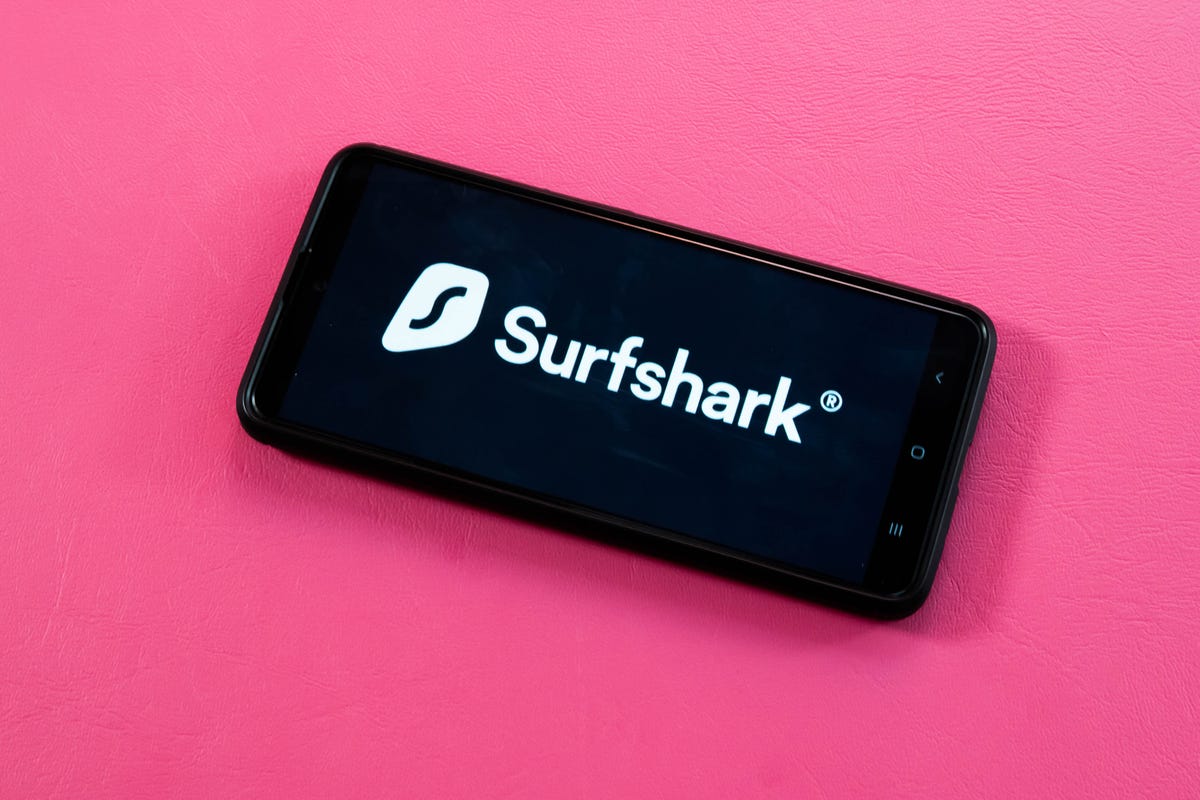
Cons
- 14-Eyes jurisdiction (Netherlands)
- No transparency reports
- Expensive monthly plan

Surfshark is an excellent budget-friendly VPN
Speed: A massive improvement over earlier speeds
- 17% speed loss in autumn 2023 tests
- Number of servers: 3,200-plus
- Number of countries: 100
I’m thoroughly impressed with Surfshark’s speed improvements over the past year. Surfshark rebounded tremendously from our previous speed tests, where it underwhelmed as an inconsistent slowpoke, sputtering along like a boxy 1989 minivan attempting to merge onto the highway. In our latest speed tests, Surfshark was reminiscent of a Formula One racer, keeping pace with other speedsters like NordVPN and ExpressVPN.
In November 2023, we tested Surfshark’s speeds from Ohio and Kentucky to servers in New York, the UK, Australia, Germany, France and Singapore, connecting through OpenVPN and WireGuard on Mac and Windows devices. We ran 600 individual speed tests on Surfshark’s global VPN servers to calculate a 17% average speed loss across servers, devices and protocols.
I was also impressed with the overall consistency of Surfshark’s speed performance. Speeds didn’t spike or dip from one test to the next like they were prone to do previously. Overall, the speed readings from our testing locations were as expected and consistent across the board. Speeds to New York and the UK were generally the fastest, independent of what protocol or device we were using. Speeds to France and Germany were also fast, but not quite as quick as New York or the UK. As expected, speeds to Australia and Singapore — the farthest distance from our testing locations — were generally the slowest.
You can also purchase a dedicated IP address for an additional $3.75 per month. If you buy a dedicated IP from Surfshark, you’ll get a personal IP address, rather than sharing the same IP address with other users. This is helpful if you want to access your bank account online from abroad. It can also help you avoid running into IP blacklists and reduce the number of CAPTCHAs you have to navigate. Surfshark’s dedicated IPs are currently available in 10 countries, including the US, UK, Germany, France and Australia.
Be aware that using a shared IP address is usually the better move from a privacy standpoint; with so many people using the same IP address, it becomes much more difficult to pinpoint any activity to a single individual. With a dedicated IP address, that IP address is used only by you, so you run the risk of someone tracing the activity associated with that IP address back to you. To combat this risk, Surfshark offers an anonymous dedicated IP option, where the IP address is completely separated from the user’s email address and cannot be traced back to any specific individual. I asked Surfshark in an interview why anyone would choose the non-anonymous dedicated IP option. Justas Pukys, Surfshark’s VPN Product Lead, told me that besides being a much easier setup, the non-anonymous dedicated IP option is refundable, whereas the anonymous option is much harder to refund because the IP address is not tied to a user in Surfshark’s database. My advice for anyone considering Surfshark’s dedicated IP is to choose the anonymous option, in spite of the more difficult setup process. Just know that you’re essentially waiving your opportunity for a refund — so be sure you need it before purchasing the add-on.
Apps are available for Windows, MacOS, Linux, Android, iOS and Amazon Fire TV. In my experience, Surfshark’s apps worked well and delivered a consistent experience across the board.
The company recently released a graphical user interface (GUI) for Linux — which is similarly easy to use as Surfshark’s apps on other platforms but is not yet quite as feature-rich. Surfshark’s Linux app includes some basic privacy features, along with Dynamic Multihop, but doesn’t include features like its CleanWeb ad and malware blocker, NoBorders mode, split-tunneling or a kill switch like its other apps do. Pukys told CNET in an interview that there are plans to potentially make the dedicated IP feature available to Linux users, but additional features are not in the works at this time. Although Surfshark’s Linux app is still rather barebones, it’s a step above many other VPN providers who only offer Linux users the option to connect via a command line interface (CLI) which isn’t as user-friendly for beginners.
If you want to use a VPN to stream content online, Surfshark is a solid choice — especially if you want to get the most out of your Netflix subscription. During my tests, I was able to access content from various Netflix libraries from around the world, including the US, UK, Germany, Belgium, Japan, Denmark and Hungary. I effortlessly streamed Disney-plus content through Surfshark as well, an improvement considering I ran into issues with it previously. I was delighted to be able to stream episode after episode of The Simpsons on Disney Plus in 4K without any issues. Streaming on Amazon Prime Video was also seamless on all platforms I tested. I encountered a few issues using Surfshark to stream content on Hulu. It worked well through Surfshark’s Fire TV Stick app but not via iOS. When I tried streaming Hulu on my Mac, I was able to access the site, but the titles refused to load until I disconnected from the VPN.
Customer support is available around the clock via live chat if you have questions or run into issues. Surfshark’s Help Center is filled with helpful articles, troubleshooting guides and tutorials for folks who prefer to investigate problems on their own.
All things considered, Surfshark offers tons of value wrapped up in a package that’s cheaper than many other top-tier VPN options — as long as you sign up for the annual subscription plan.
Privacy and security: Consistent privacy improvements, but transparency could use a boost
- Jurisdiction: Netherlands
- Encryption: AES-256-GCM, ChaCha20
- RAM-only server infrastructure
- Protocols available: OpenVPN, WireGuard, IKEv2
I’m encouraged by Surfshark’s burgeoning commitment to user privacy. It’s still not quite on the level of ExpressVPN, Private Internet Access or Proton VPN in terms of transparency — ExpressVPN has an extensive trust center and is unmatched in terms of its third-party audit count, and PIA and Proton are both fully open-source and regularly publish transparency reports. I’ve seen consistent progress from Surfshark recently in its efforts to enhance user privacy.
Perhaps the most noteworthy privacy initiative Surfshark continued developing over the past year is its proprietary Nexus network. With its Nexus technology, Surfshark can connect its entire network of servers together and deploy a few innovative VPN privacy features in the process. Essentially, Surfshark’s Nexus technology helps route users’ VPN connection through multiple servers throughout the network instead of just one. Surfshark was able to leverage Nexus to roll out features like its IP Rotator and Dynamic Multihop features, adding additional layers of privacy. Pukys also said that the technology boosted the stability of the network, resulting in fewer dropped connections.
Surfshark’s IP Rotator, Dynamic Multihop and IP Randomizer features soup up your privacy
The IP Rotator feature changes your IP address every few minutes while staying connected to the same location and without breaking the connection. This can provide additional privacy by making it harder for anyone to track you or pinpoint you to a single IP address. Rotator worked well during my testing, and I maintained a stable connection throughout several IP changes. I experienced no noticeable disruption in my connection or internet activity as one IP address was swapped out for another.
Surfshark’s Dynamic Multihop is another easy way to boost your privacy while using the VPN. While multi-hop VPN connections aren’t new or exclusive to Surfshark, Dynamic Multihop takes the idea of double-VPN and enhances it. Traditionally, VPN providers — like NordVPN, for example — who offer multihop connections limit users’ choices to a handful of preset double-VPN connections. This is great and provides an extra layer of privacy, but the available preset selections may not be ideal for all users. Surfshark’s Dynamic Multihop lets you choose any two servers you want to route your connection through. Therefore, you shouldn’t have any issues choosing two servers close by to optimize your speeds while doubling the protection you get from the VPN. That’s advantageous because a multi-hop connection generally slows your speeds even more than a standard VPN connection. If you have critical privacy needs, Dynamic Multihop is an easy way to boost your privacy with Surfshark.
After I brought the matter up to the Surfshark team during our interview, they acknowledged the issue and pledged to deploy a solution as a priority. A representative from Surfshark later confirmed via email that the company is launching a notification in the next release of its MacOS and iOS apps alerting users that the VPN will disconnect during the location change. The latest MacOS version is now available and includes the new alert, but the iOS update is not yet available. The notification pop-up on Surfshark’s MacOS app confirms with the user if they want to proceed, at which point they can continue or cancel the server switch. The representative said that Surfshark is now working on a long-term solution to the issue, which will require additional time for development and testing.
While there is currently no timetable for the release of the long-term solution, the representative assured me that the team is working on it as a top priority. In the meantime, MacOS users should update to the latest version right away, iOS users once the latest update is available and users on other platforms should be careful to close out of anything potentially sensitive prior to initiating a jump from one server location to another.
Surfshark is a wallet-friendly, reasonably fast and well-rounded VPN
I’m happy with Surfshark’s improvements regarding transparency and user privacy overall. I’m also impressed with how responsive the team was to my concerns and how quickly they acted to begin addressing them to make their VPN product safer. There’s still some work to be done on that front, but I think Surfshark is headed in the right direction. In any case, Surfshark is an excellent option for budget-conscious VPN users who enjoy streaming content and want an affordable VPN that’s innovative when it comes to privacy.


